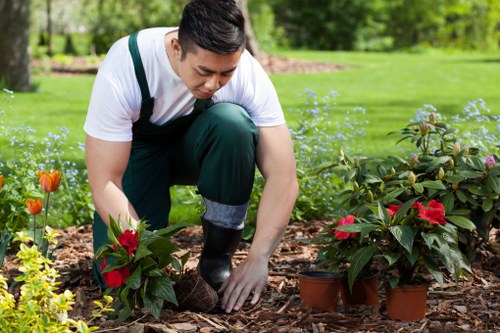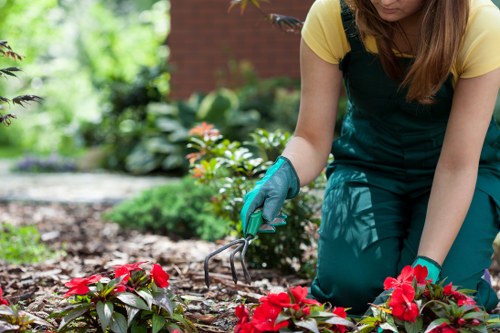Garden Maintenance Forest Gate

Garden Maintenance in Forest Gate is essential for keeping your outdoor space beautiful, safe, and healthy. Forest Gate is a vibrant community where garden maintenance is not just about aesthetics but also about creating a sanctuary for local wildlife and a peaceful retreat for residents. Garden maintenance includes a range of tasks from regular lawn mowing to the careful pruning of trees and hedges, ensuring that every part of your garden thrives.
The meticulous upkeep of gardens in Forest Gate helps prevent overgrowth, reduces the risk of pest infestations, and enhances neighborhood appeal. Whether you are a homeowner or a business owner, investing in garden care boosts the overall property value and enriches your outdoor environment. Regular maintenance also contributes to a more sustainable ecosystem in the area.
For those looking for professional garden maintenance services in Forest Gate, there are many experts in the business who offer seasonal plans, customized care, and eco-friendly solutions. With a mix of traditional techniques and innovative practices, these professionals deliver a balanced approach that respects nature while ensuring a polished appearance.

Local gardening tips often emphasize the need for consistency and attention to detail. Garden maintenance is not just a one-time project but an ongoing commitment. The use of organic fertilizers, composting, and water conservation methods are increasingly popular among local gardeners. These methods not only enhance the vibrancy of your garden but also contribute significantly to a greener and cleaner environment.
In Forest Gate, community gardens and public green spaces are maintained with the same care as private properties. This shared commitment to garden upkeep fosters a sense of community, as neighbors work together to create landscapes that are both functional and visually pleasing. The balance between utilitarian garden features and artistic landscaping is a point of pride for many local residents.
Sustainable garden maintenance practices are important when planning your garden’s future. These methods include using native plants that require less watering and natural pest control strategies that avoid harsh chemicals. In addition, the integration of features such as rainwater harvesting systems and solar-powered garden lights is on the rise. This eco-friendly approach helps conserve resources and reduces the environmental footprint of garden maintenance projects.

Understanding the Essentials of Garden Maintenance
Garden maintenance is about creating and maintaining a balance between beauty and sustainability. Regular care includes pruning shrubs, cutting the lawn, weeding flower beds, and maintaining paths and fences. Each task plays an important role in ensuring that the garden stays healthy and welcoming.
The benefits of routine maintenance extend far beyond casual appearance improvement. Regular upkeep helps in early detection of plant diseases and pest infestations, which can be managed before they lead to extensive damage. It also ensures that plants receive the nutrients they need through timely feeding and mulching.
Moreover, maintaining a garden provides unbeatable mental and physical benefits. Gardening is well-known for reducing stress, promoting physical exercise, and improving mental clarity. In Forest Gate, many residents find solace in tending their gardens, passing on the traditional values of community and resilience.

Seasonal Garden Maintenance: A Year-Round Approach
Seasonal garden maintenance is crucial in Forest Gate where the weather can change rapidly. During the spring, the focus is on planting new seedlings, fertilizing, and preparing garden beds for growth. Spring maintenance is the foundation for a lush garden throughout the year.
Summer calls for regular watering, weeding, and the occasional aeration of the soil. Gardeners are advised to invest in efficient irrigation systems to optimize water usage during these warmer months. It is also the right time to prune flowering shrubs once they have finished blooming.
As autumn arrives, the focus shifts towards preparing the garden for the winter months. This includes clearing fallen leaves, protecting delicate plants, and preparing the soil with organic matter. A well-prepared garden can withstand the colder weather and will be ready to burst into life again in the spring.

Technology and Techniques in Modern Garden Maintenance
Today’s garden maintenance in Forest Gate incorporates modern technology alongside traditional techniques. Many garden services now use advanced equipment such as battery-powered mowers, automated sprinklers, and soil moisture sensors. These advancements make garden maintenance more efficient and less labor-intensive, allowing for regular care even with a busy schedule.
Innovative landscape care tools have transformed how gardens are maintained. Tools that once required significant manual labor are now streamlined with technology, enhancing both productivity and the overall results. Mobile apps that schedule maintenance tasks and send reminders are also gaining popularity among homeowners and professional garden keepers.
Training and expertise are essential in the effective use of these modern techniques. Professionals in Forest Gate often attend workshops and certification programs to stay updated with the latest practices in garden maintenance. This continuous learning ensures that safety and environmental considerations are always a priority.
Key Elements of an Effective Garden Maintenance Plan
Creating a garden maintenance plan tailored to your needs is an excellent way to ensure that your garden remains flourishing all year long. A great maintenance plan includes regular schedules for mowing, pruning, fertilizing, and pest control.
An effective plan also considers the unique climate and soil conditions of Forest Gate. Understanding local weather patterns and soil composition helps in selecting appropriate plants and maintenance methods. Gardeners are encouraged to conduct soil tests and use organic compost to enrich the earth.
In addition, it's important to plan for seasonal maintenance tasks. For example, spring is ideal for planting and fertilizing, summer for watering and weeding, autumn for preparing the garden for winter, and winter for planning the next year’s projects. This type of structured maintenance leads to healthier plants and more vibrant landscapes.
Checklist for Seasonal Garden Maintenance
- Spring: Plant new beds, fertilize, and control early pests.
- Summer: Water regularly, weed, and prune flowering plants.
- Autumn: Mulch, clear debris, and prepare soil for winter.
- Winter: Prune dormant trees and plan garden improvements.
Extra Tips from Local Experts
Local garden experts in Forest Gate often suggest incorporating native plants into your garden design. Native species are more resilient to local pests and require minimal watering. They make garden maintenance easier and more sustainable over the long term.
Another suggestion is to use organic fertilizers such as compost or manure, which improve soil health without the negative effects associated with chemical treatments. Organic methods not only promote plant growth but also encourage beneficial microorganisms in your soil.
Regular monitoring is key. Walk through your garden each week to spot any issues like fungi, fungal spots, or pest damage. Early detection allows for immediate intervention, minimizing long-term damage and saving you both time and money.
Common Problems and Their Solutions in Garden Maintenance
Even with regular care, gardens can face challenges such as pest invasions, fungal infections, or weed overgrowth. In Forest Gate, where urban stresses are high, these challenges require prompt and efficient solutions.
Pest control is a frequent topic of concern. Common pests include aphids, slugs, and snails. A variety of organic and chemical solutions are available, and local garden maintenance experts often recommend organic pesticides that protect both your plants and the local wildlife.
Weeds, if left unchecked, can overrun a garden quickly. They compete with your plants for water and nutrients. Regular weeding, coupled with mulching, helps in managing weed growth effectively, keeping your garden healthy.
Dealing with Soil Issues
Healthy soil is the cornerstone of successful garden maintenance. Over time, soil can become compacted or depleted of essential minerals. Regular soil testing is important to ensure the right pH balance and nutrient content for your plants.
In cases of soil depletion, adding organic matter, such as compost or well-rotted manure, can be a great solution. Organic matter improves soil structure, water retention, and nutrient availability. Additionally, rotating your crops can prevent soil exhaustion and reduce the prevalence of soil-borne diseases.
If you notice areas where the soil seems particularly compacted, consider aerating the soil. This simple process allows air, water, and nutrients to better penetrate the roots, leading to healthier plant growth.
Local Relevance: Nearby Areas to Forest Gate
Garden maintenance in Forest Gate has a special charm due to the close-knit community and the shared love for greenery. The local environment has influenced many garden maintenance styles that are uniquely adapted to urban living. Residents and garden professionals continually adapt their strategies to address local challenges such as space constraints and pollution.
Forest Gate is well connected to several nearby areas where garden maintenance practices intersect. Some of these nearby areas have their own gardening traditions that blend modern techniques with centuries-old practices.
Below is a list of 10-15 areas closely connected to Forest Gate, each contributing uniquely to the local landscape culture:
- Wanstead: Known for its historic parks and well-maintained private gardens, Wanstead offers a blend of tradition and modern eco-friendly practices.
- Leyton: With a focus on community gardens, Leyton provides innovative ideas for sustainable urban gardening.
- Stratford: This rapidly developing area combines modern landscaping with eco-conscious maintenance strategies.
- Chingford: Rich in history and natural beauty, Chingford’s gardens reflect both classic and contemporary gardening techniques.
- Hackney: A hub for urban gardeners, Hackney pushes forward with creative designs and experimental gardening trends.
- Woodford: With an emphasis on preserving green spaces, Woodford’s garden care focuses on natural growth and organic methods.
- Ilford: Balancing urban development with nature, Ilford’s greenspaces are meticulously maintained with community input.
- Tottenham: Known for its vibrant community gardens, Tottenham offers diverse plant species suited to urban living.
- Redbridge: Redbridge is celebrated for its excellent infrastructure for garden care, making use of both technology and traditional methods.
- Lea Bridge: This area integrates modern landscaping trends with accessible community gardening projects.
Each of these areas connects with Forest Gate in unique ways, sharing similar challenges such as space management and urban pollution. They also share innovative solutions that are continually evolving with the needs of urban communities.
Forest Gate’s connectivity to these nearby areas enhances the overall quality of garden maintenance in the region. Residents benefit from exchanging ideas, techniques, and resources, making the local gardening community one of the most dynamic and forward-thinking in the area.
Expert Advice for Home Gardeners in Forest Gate
For home gardeners in Forest Gate looking to up their garden maintenance game, expert advice can be invaluable. Local garden experts suggest beginning with detailed planning. Map out your space, define zones (flower beds, vegetable patches, relaxed seating areas), and invest time in understanding each zone’s needs.
Invest in good equipment. Quality tools make a huge difference in the efficiency and outcome of your efforts. From hedge trimmers and lawn mowers to hand tools for planting and weeding, having the right gear at your disposal is paramount.
Start small and scale up gradually. Experiment with one section of your garden before applying the same techniques to the entire area. This approach allows you to learn what methods work best in your particular setting while minimizing initial risks and expenditures.
Eco-Friendly Alternatives in Garden Maintenance
Adopting eco-friendly practices in garden maintenance is not only beneficial for the environment but also for your garden’s long-term health. One popular method is composting organic waste. Compost enriches the soil naturally and reduces the need for artificial fertilizers.
Organic gardening avoids harsh chemicals and encourages natural pest control. Introducing natural predators like ladybugs and birds can help keep your garden free of pests while maintaining a balanced ecosystem.
Another eco-friendly option is the use of rainwater harvesting systems. These systems collect and store rainwater that can be used during dry periods, reducing overall water consumption and promoting sustainability in garden maintenance practices.
Long-Term Benefits of Regular Garden Maintenance
Maintaining your garden with regular care fosters a deeper connection to nature. In Forest Gate, consistent garden maintenance creates a serene outdoor space that is both aesthetically pleasing and beneficial to local wildlife. The long-term benefits include increased property value, improved air quality, and a healthier environment.
Economic and environmental advantages of regular garden care are numerous. When gardens are well-maintained, they require fewer expensive emergency interventions. Moreover, a healthy garden also plays a role in mitigating urban heat islands and contributes to biodiversity.
As residents invest time and resources in their outdoor spaces, they develop a greater appreciation for nature and the importance of sustainable practices. This proactive approach reaps rewards not only in immediate visual improvements but also in lasting environmental benefits that support the entire community.
Community Involvement in Garden Maintenance
Community gardens provide a platform where residents of Forest Gate can collaborate on large-scale garden maintenance projects. These gardens foster social interaction, knowledge sharing, and community pride. Engagement in community garden projects can lead to improved local food production and environmental stewardship.
Many local groups arrange monthly meet-ups to discuss new ideas, challenges, and successes related to garden maintenance. These initiatives foster a sense of belonging, encourage outdoor activities, and create a network of individuals committed to nurturing their green spaces. The collective efforts often result in more robust and resilient gardens that benefit everyone in the neighborhood.
Local authorities and community organizations sometimes provide grants and educational workshops to promote sustainable garden maintenance. These opportunities allow residents to learn from professionals and apply tested methods in their own gardens, ensuring a thriving local ecosystem.
Measuring Success in Garden Maintenance
Success in garden maintenance is measured in the vibrancy and health of your outdoor space. In Forest Gate, a well-maintained garden is characterized by robust plant growth, vibrant colors, and an overall balanced ecosystem. Monitoring the progress of your garden through regular observations helps you identify what is working and what may need improvement.
One effective method is to keep a garden journal. Document seasonal changes, note the effects of different fertilizers, and plan future maintenance activities based on past experiences. This habit not only tracks progress but also builds a personal history of your garden’s evolution.
The use of technology, such as smartphone apps and weather tracking systems, can provide detailed insights into the conditions affecting your garden. Automated reminders for watering and fertilizing can help maintain a regular schedule, ensuring that every aspect of your garden receives the care it needs.
Recognizing Milestones in Your Garden
- Early Bloomers: A sign that your soil is healthy and plants are well cared for.
- Increased Biodiversity: More insect and bird activity indicates a balanced ecosystem.
- Vibrant Colors: Lush, multi-colored plants reflect proper maintenance and nutrient availability.
- Healthy Lawn: Regular mowing and proper watering lead to a uniformly green lawn.
Final Thoughts on Garden Maintenance in Forest Gate
In conclusion, garden maintenance in Forest Gate is more than a routine task—it is a lifestyle that intertwines environmental care with the pleasure of nurturing beautiful spaces. Whether you choose to handle it on your own or hire professionals, the key is to remain consistent, be proactive, and embrace sustainable practices. With the right strategy in place, your garden can become a source of pride, a haven for local wildlife, and a true extension of your home.
By taking a balanced approach that combines modern technology, eco-friendly practices, and traditional gardening wisdom, residents of Forest Gate continue to lead the way in creating inspiring outdoor environments. The roads to better garden maintenance start at home, extend throughout the community, and ultimately help shape a greener future for everyone.
Feel free to revisit this article for ongoing tips and ideas. With evolving practices and continuous learning, optimal garden maintenance is a journey that grows alongside nature itself. Enjoy the process, cherish your green spaces, and let your garden tell its own story of care and commitment.
Frequently Asked Questions (FAQs)
1. What are the basic tasks involved in garden maintenance in Forest Gate?
The basic tasks include mowing lawns, pruning trees, weeding flower beds, fertilizing, and pest control. Additionally, seasonal tasks such as soil testing and mulching help maintain a healthy garden ecosystem.
2. How do I start my own garden maintenance routine?
Begin by planning your space, defining different zones, and investing in good quality tools. Start small, note seasonal changes, and gradually expand your efforts. Consider attending local workshops and using smartphone apps to help track your progress.
3. What eco-friendly practices can I include in my garden care routine?
You can incorporate organic fertilizers, composting, rainwater harvesting systems, and natural pest control methods. These practices not only promote a healthier garden but also minimize environmental impact.
4. Can professional garden maintenance services benefit my property in Forest Gate?
Yes, professional services offer tailored maintenance plans, advanced techniques, and efficient use of modern equipment, ensuring your garden remains attractive and sustainable throughout the year.
5. What nearby areas influence garden maintenance practices in Forest Gate?
Areas such as Wanstead, Leyton, Stratford, Chingford, Hackney, Woodford, Ilford, Tottenham, Redbridge, and Lea Bridge all contribute ideas and techniques that enrich the local garden maintenance culture.

